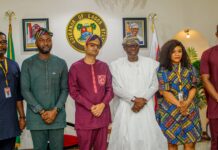The NCC’s Executive Commissioner, Stakeholder Management, Mr Adeleke Adewolu, took a look at multiple taxations, an issue the Bola Tunubu administration is currently reviewing, and offered a pathway in which taxation can be administered to stimulate economic development.
Adeleke spoke at an NCC’s recently held Regional Workshop with Industry Stakeholders in the ancient city of Ibadan, Oyo State.
The workshop was hosted specifically to jaw with senior government functionaries from all the States in the South West Geo-political Zone in order to build a better understanding of how cancerous and harmful the issue of multiple taxations and regulations being imposed on the telecom companies by the States and their agencies and agents can be to the country’s development.
According to him, taxation should seek to be neutral and equitable between forms of business activities because a neutral tax will contribute to efficiency by ensuring that optimal allocation of the means of production is achieved.
He said tax rules should be clear and simple to understand so that taxpayers know where they stand, adding that a simple tax system makes it easier for individuals and businesses to understand their obligations and entitlements. As a result, businesses are more likely to make optimal decisions and respond to intended policy choices.
While contending taxation should be effective and fair, the EC added that taxation should produce the right amount of tax at the right time, while avoiding both double taxation and unintentional non-taxation. In addition, the potential for evasion and avoidance should be minimised.
On the need for taxation to be flexible Adeleke said that the taxation systems should be flexible and dynamic enough to ensure they keep pace with technological and commercial developments and it is important that a tax system is dynamic and flexible enough to meet the current revenue needs of governments while adapting to changing needs on an ongoing basis.
.The curious question, that this workshop will attempt to answer, is how a fiscal tool for economic development like taxation can become inimical to economic development.
He posited that since taxation is the backbone of public finance it is imperative therefore to correct some misconceptions about taxation, particularly the misguided notion of taxation as a penal tool for thriving business enterprises.
He said taxation “provides guaranteed and sustainable sources of funding for social programs and public investments, it also serves as a tool curated by the government to effectively and efficiently distribute our commonwealth. It is thus evident that taxation is critical for making growth sustainable and equitable.
“Thus, taxation by design is an instrument for economic development and it is important to acknowledge and support the initiative of all tiers of Government in using taxation as an instrument for socio-economic development.
“However, supporting the tax initiatives by the various tiers of Government includes indicating where a category of taxes has become cancerous to economic development. These types of taxes typically manifest themselves in the form of multiple taxation and by design, they reverse growth, stifle innovation and discourage investment. In parabolic terms, they are the scarecrows mounted by the government to disincentivize development.
“It is pertinent to note that the National Tax Policy 2017 emphasizes the need to eradicate multiple taxation at all tiers of government. Specifically, the Policy states that taxes similar to those being collected by a level of Government should not be introduced by the same or another level of Government. The Federal, State and Local Governments shall ensure collaboration in harmonizing and eliminating multiple taxation.
“Also, the President and Commander-in-Chief of the Federal Republic of Nigeria, His Excellency, President Bola Ahmed Tinubu, in his commitment to address the vexed issue of multiple taxation, recently signed a number of Executive Orders to curb arbitrary taxes in the Country.
“Also, the inauguration of the Committee on Fiscal Policy, and Tax Reforms by the President, which is geared towards harmonizing taxes will provide an avenue to further engage various stakeholders in order to identify their pain points and critical concerns bothering tax and fiscal policies. This would also facilitate a conducive environment for conducive for local and foreign investment in the
country.
“What then is multiple taxation? According to the National Tax Policy 2017, Multiple Taxation is the imposition of the same or similar taxes on the same income base, transaction or person by one or more levels of Government, in one or more jurisdictions. While a level of multiplicity is expected in a federal system of governance, the levying of a particular tax on the same person/entity, in respect of the same liability by more than one State or Local Government Council should be avoided.
“The paradox of multiple taxation is that it does not lead to an increment in government revenue, rather the crippling effect of these taxes, is that it makes otherwise profitable businesses, unprofitable. It negatively impacts the ease of doing business, shrinks the tax base, incentivizes tax evasion and complicates tax compliance. “The paradox of multiple taxation is that it does not lead to an increment in government revenue, rather the crippling effect of these taxes, is that it makes otherwise profitable businesses, unprofitable. It negatively impacts the ease of doing business, shrinks the tax base, incentivizes tax evasion and complicates tax compliance.
“According to the World Bank, taxing a specific tax base will lead to increasing revenues up to a specific point, after which the overall tax revenue will decline because companies go out of business, or evasion increases significantly.
In addition to these challenges, the economic burden of multiple taxation is further exacerbated by the administrative burden of complying with these taxes.
“It further makes Nigeria an undesirable ground for breeding healthy business and competitive practices. The effect of this is that business enterprises in Nigeria struggle to compete with their counterparts abroad. These incidents weaken our economic foundations, devalue the symbol of economic strength, which is our currency – the Naira and contract our gross domestic product.
This Workshop is therefore an avenue to rethink our approach towards taxation by adhering to its founding principles. What then are the overarching principles of taxation? The Policy direction of the Federal Government is that all tiers of government are expected to align, as closely as possible, to the fundamental principles of taxation” he concluded.












